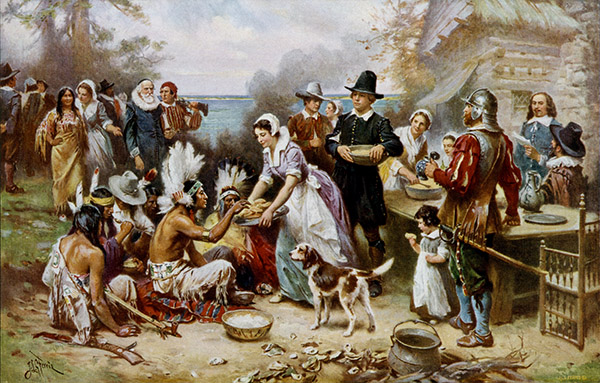 Many people don't know the real origins of "Thanksgiving". They just have a happy family get-together, pig-out on turkey, and call it a Thanksgiving night. People have even nick-named Thanksgiving as "Turkey Day". The day after, they go crazy spending lots of money that they don't have, on purchasing items they don't need, on a day called "Black Friday". It's called black due to the streets getting crowded with mobs of people in search of "deals". Do you remember reading those scary stories about how the monsters would first feed children a lot of food, fatten them up, and then eat them? The same idea is carried in Thanksgiving. You eat very well on Turkey Day and fall into deep sleep. The next day you have to wake up very early for the early-bird specials. What happens is that people are walking around like half-asleep zombies grabbing anything and everything they think is a good deal. But not to get too side-tracked, what really began the Thanksgiving day? Who declared it as a national holiday of feasting and festivities? The first official "Day of Thanksgiving" was proclaimed in 1637 by Governor Winthrop. He did so to celebrate the safe return of men from Massachusetts who had gone to Mystic, Connecticut to participate in the massacre of over 700 Pequot women, children, and men. "Massacre" you might ask? Well, there are 2 versions to the "Thanksgiving story". Version 1. The Happy story People in England were being persecuted for their variant religious beliefs. In order to escape religious persecution from the main-stream religion, some of the English left England to re-establish themselves in a new land. They landed in Plymouth, Massachusetts. They were greeted by the American Indians who became their friends. The American Indians helped the incoming English settlers (pilgrims), and so they all had a celebration feast that they called "Thanksgiving". Today, Thanksgiving is a day when the pilgrims gave thanks to God for their survival and journey into the "new world". Version 2. The Historical Facts The English did not need to escape religious persecution in England. They could've went to Holland to escape religious persecution. They came to the North American Continent looking for wealth and power that they could not have in England. That is why they risked their lives in moving. When they landed in the North American continent, they found out that the American Indians were not welcoming them with open arms. So they waged wars against the various tribes of the American Indians. They managed to kill several people and take families as slaves. In subsequent journeys, they transported blankets contaminated with the Small Pox Virus. They gave the blankets to the American Indians to keep them warm for the winter. The American Indians became sick and several of them died as a result. Entire villages were wiped out because they did not know how to face the disease. When the English returned, some saw it as "a sign from God" for them to take over the land. They fought wars after wars against the American Indians, betrayed their trusting nature, and killed the majority. All the while, the English fought against their own England and converted a part of the North American Continent into their own. The long war between the "Pilgrims" and the American Indians finally ended when they managed to push the Indians to the complete south of the Continent. Now, the several of the Indian tribes reside in Mexico and in reservations within the USA. While Thanksgiving is a day of happiness and family-getting together for a lot of the US families, it is observed as a solemn day of mourning by the American Indians, in memory of entire tribes that were wiped out by the "pilgrims" in their search of power, land-ownership, and riches. You can verify all of this material on google under the keywords: origin of thanksgiving, or American Indians and Thanksgiving. You will find countless websites run by American Indian organizations, and Scholars who know the real story behind Thanksgiving. Questions: What is your opinion? Is it good to keep people in the dark about the past, or should people be informed? Should the second version be taught in schools instead of the first version? Do you know of some similar story of your country's past? Sources: http://www.uaine.org/ http://www.huffingtonpost.com/richard-schiffman/the-thanksgiving-truth_b_1105181.html http://jdstone.org/cr/files/nothankstothanksgiving.html
0 Comments
Your comment will be posted after it is approved.
Leave a Reply. |
Author: [email protected]Jacob is an English Teacher and Blogger with several years of Experience as an English teacher. ArchivesCategories |
